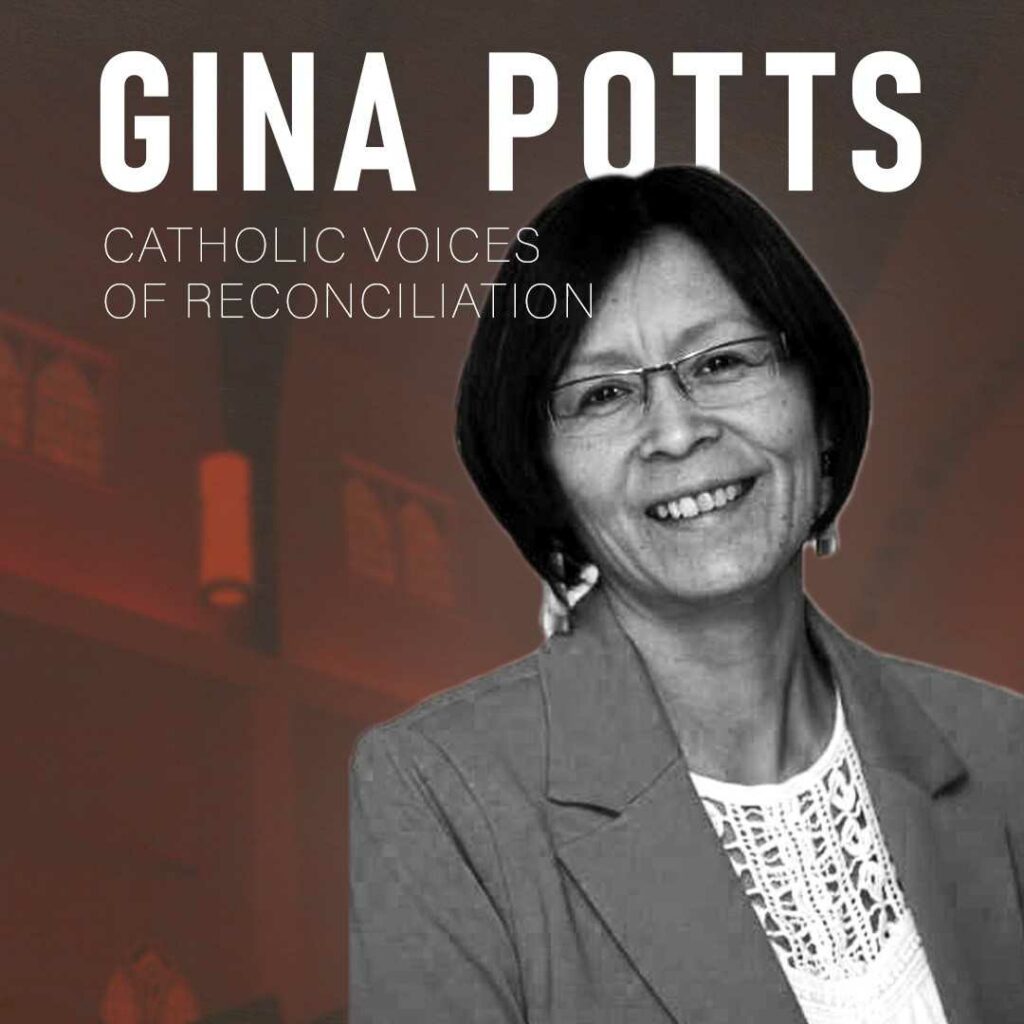Catholic Voices Of Reconciliation is a series of interviews with Catholic First Nation individuals who were a part of Pope Francis’ visit to the Edmonton Archdiocese. We asked each of them three questions about their experience as both followers of Christ and First Nations people and practical ways that local Catholics can support truth and reconciliation.
Gina Potts is Nakota from Alexis Nakota Sioux First Nation. She is a life-long Catholic and a member of the Lac St. Anne community in the Archdiocese of Edmonton, Alberta. She was an organizer for and was present when the Pope visited Lac St. Anne during his 2022 Canadian Papal visit.
What is one way that the Pope’s visit has impacted you?
The pope’s visit to Lac Ste. Anne was quite profound.
My late parents, they raised me to be a Catholic. And that came from my parents, but also my grandparents, my great-grandparents. So I have this long lineage of Catholicism in my life.
But I was also raised as a Nakota. Being Nakota, I was raised with my language. I was raised with this balance between who I am with my culture and my Catholicism. . . understanding there is one God. How the pope’s visit impacted me: He came to our “Holy Land” you know, to a place where our people had a vision of spiritual blessing for Lac Ste. Anne.
I’ve had opportunities to go to Rome and to the Holy Land. But if I went there, I would be going alone. So, the pope’s visit here to Lac Ste. Anne was profound because my parents and grandparents are gone. So, in spirit, I felt that I could share this encounter with His Holiness, in our Holy Land, [with those who have passed away].
It’s like Jesus came to us. That’s how I felt about the visit. He came to reconcile with us, as the vicar of Christ. He came to us. That is profound to me.
By no means is Christ responsible for what happened to us in residential schools, in colonization, in genocide that occurred. Christ did not have a part in that. Humans had a part in that. So, when His Holiness came to our Holy Land I felt that it was an indicator to walk with Christ.
It was important to me to also have my children involved. My sons were there drumming, they drummed at Lac Ste. Anne. So I was with family, so we had this encounter together. And so that affirms who I am as a Nakota Catholic.
What is one way that the efforts towards truth and reconciliation has blessed you personally?
You know, this is a tough question. Because as a Catholic Nakota woman, I am amongst my people all the time. There is a lot of anger. There is a lot of hate, judgment. And we are going through a period of persecution as you know, Indigenous Catholics. Because there is a large number of Indigenous people who are very angry. There is a lot of work to be done.
As Nakota Catholics we walk that road very gently, trying to understand our brothers and sisters and their rage. And my mother, my parents, having been Indian residential school survivors. . . it’s horrific, the experience that they had.
So, the Church. . . has a lot of work to do. I go to other parishes for Mass and I’m the only First Nations person in those parishes. And when I go to church. . . I don’t see our people. When (they) think of Truth and Reconciliation Day, they think it is a day for Indians. But we all need to take ownership.
What is one practical way that people in your local community can support the continued healing between First Nations people and the Church?
This is our land. This is our traditional territory, and yet there is no [land acknowledgment before Mass]. And sitting inside a church when there is a land acknowledgment, I feel validated. So there needs to be that land acknowledgment. It could be very specific. You know the land where [I am] it is Nakota, Cree, and Dene.
Enough of this “Indigenous people” melting pot. We are very different people. Even within our tribes we have cultural diversity, there is not a universal way of doing stuff. There is a lot of work to be done!
Jenny Connelly – Archdiocese of Edmonton

